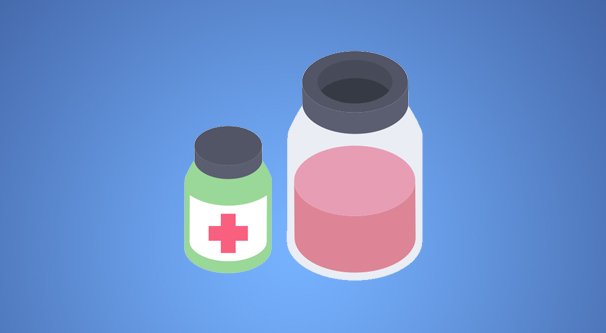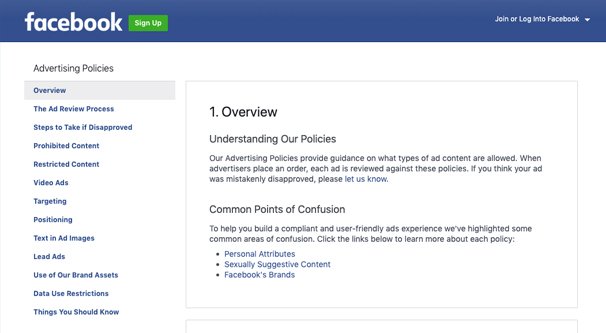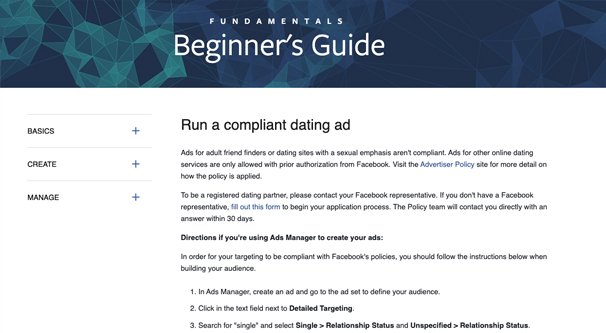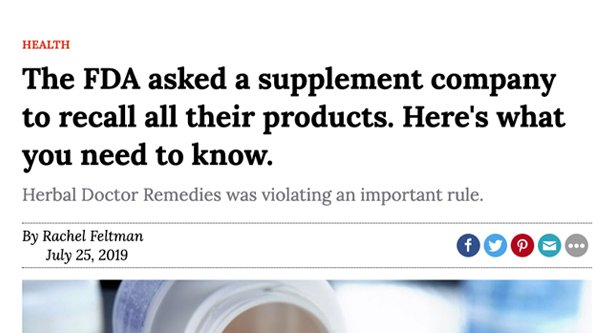How to Run Facebook Ads for a Supplement Business

When you’re running a business that deals in health supplements, you already have a lot of hurdles to jump.
- Health is a billion-dollar industry, so competition is insane for every possible niche.
- Health products have a sketchy history, and you have to fight the bias against snake oil.
- Supplements can be dangerous on occasion, so you have to make sure the supplements you carry are at worst empty pills.
On top of that, you have to consider the fact that many ad networks simply don’t allow supplement products at all. So how can you possibly compete?
The Facebook Hypocrisy
Facebook is a platform that has a ton of different policies, ranging from what can and can’t be advertised to specific uses of text on images to rate limits on actions you can take.
One set of policies that is important to our discussion today is what is and isn’t allowed in Facebook ads. The greater ad policy document has an entire section on prohibited content and another on restricted content.
Prohibited: anything illegal, anything discriminatory, anything tobacco, anything drug or drug-related, any “unsafe” supplements, any weapons or explosives, any adult products or services (with the exception of contraceptives), any adult content, anything “sensational”, anything infringing on a third party copyright or trademark, anything calling out personal attributes of the audience, anything misleading or controversial, any non-functional landing pages, anything used for covert surveillance, any profanity, anything with before and after images, any payday loans, any MLMs, any penny auctions, any counterfeit products or documents, anything too low quality, any malicious software or spyware, any autoplay animation, any unauthorized streaming products, any financial services prohibited in their list, and any human body parts or fluids.
Hold on a second, I need to catch my breath. There’s a lot there. That doesn’t even get into the restricted content.
Restricted: Alcohol in some countries, dating services without prior approval, real money gambling, state lotteries, online pharmacies, OTC drugs, subscription services, financial and insurance products, third party branded content, social issues, elections and politics, cryptocurrencies, drug addiction and treatment, and weight loss products.
All of the prohibited content is allowed in certain circumstances. Some are specific restrictions on, say, ad targeting. For example, you can advertise any weight loss product or diet plan you want, but only if it’s targeted at people 18 or older. Targeting minors with such ads is damaging.
Why do I label this the Facebook Hypocrisy? Well, you’ve seen it. You’ve seen any number of those products being advertised on Facebook before, I can almost guarantee it. Unless you’ve worked hard to keep Facebook ads blocked, which is difficult because Facebook is constantly changing their site to confound ad blockers.
If, say, firearms are banned from advertising on Facebook, but you see ads for firearms, what does that say? Did those people somehow get a special deal from Facebook? Are they just slipping through the cracks?
The answer is, in a sense, both.
Some businesses manage to slip through the cracks. They create new accounts specifically for the purposes of advertising, run a few ads targeting their landing pages, and successfully advertise for a while. They promote prohibited products and get away with it for a short time. Somehow their ads pass the basic initial check, but if anyone reports them, chances are the ads will be removed.
On the other hand, some businesses are able to get special permission from Facebook. For example, dating sites are a niche with a small handful of popular, useful options, and about a half a million niche sites populated entirely by bots and by rubes who think this niche will somehow improve their chances.
Dating sites are one of the best examples, because some dating sites are allowed to advertise on Facebook, but most aren’t. The difference is, the ones that are allowed have filled out the form to apply for special permission, which Facebook has granted. In order to approve such a site, Facebook needs to be able to log in, you need to have an advertising plan, and you have additional restrictions on what you can and can’t use to advertise.
Where Supplements Fall
Supplements can fall into a number of different categories, which may have different restrictions placed on them.
Here are the ones I think might apply to some supplement brands, and the full restrictions Facebook mentions:
- “Illegal Products or Services. Ads must not constitute, facilitate, or promote illegal products, services, or activities. Ads targeted to minors must not promote products, services, or content that are inappropriate, illegal, or unsafe, or that exploit, mislead, or exert undue pressure on the age groups targeted.” Some supplement ingredients are illegal in some countries, and thus advertising those supplements falls into this category.
- “Drugs & Drug-Related Products. Ads must not promote the sale or use of illegal, prescription, or recreational drugs.” Again, some supplements might contain illegal or regulated ingredients. This is most noteworthy with CBD and Marijuana-related products at the moment.
- “Unsafe Supplements. Ads must not promote the sale or use of unsafe supplements, as determined by Facebook in its sole discretion.” According to Facebook, this includes but is not limited to anabolic steroids, chitosan, comfrey, dehydroepiandrosterone, ephedra, and human growth hormones. Of course, Facebook can add other ingredients to this list at any time.
- “Personal Health. Ads must not contain “before-and-after” images or images that contain unexpected or unlikely results. Ad content must not imply or attempt to generate negative self-perception in order to promote diet, weight loss, or other health related products.” Some supplements are used in weight loss and thus may try to advertise in a way that is prohibited here.
- “Multilevel Marketing. Ads promoting income opportunities must fully describe the associated product or business model, and must not promote business models offering quick compensation for little investment, including multilevel marketing opportunities.” Some supplement businesses – including big names like Amway and Herbalife – rely more on their pyramid scheme structure than on selling products and are thus prohibited.
You might also consider a supplement business related to an online pharmacy, which would have various restrictions placed on it as well, but generally supplements do not need prescriptions and thus are not going to be subject to those rules. If you’re also trying to sell prescription drugs, you have to get written permission from Facebook before you can advertise, just like with dating.
How to Advertise a Supplement on Facebook
If you want to advertise a supplement business on Facebook, there’s some good news and some bad news. The good news is, you can, and the Facebook rules don’t actually stop you. The bad news is, you’re in a tight position and have to stay within the rules at all times, otherwise you might get suspended or banned. Here are my tips for navigating these treacherous waters.
Don’t run ads that break a rule just because someone else got away with it. This is the biggest mistake I see businesses make all the time. Yes, there are a whole lot of businesses that get away with running ads that break the rules, for a while. What you don’t see is the fact that most of these businesses are constantly being suspended and appealing, constantly tweaking their ads to skirt in just barely under the radar, and they don’t work all that well to begin with. It’s much better in the long run to stay within the rules. Heck, report those violating ads, especially when they’re your competition.
Make sure your supplements are as safe as possible. This should go without saying, but you want to make sure the ingredients in your supplements are harmless or beneficial. Anything that could be seen as harmful, especially by the FDA, can be added to Facebook’s list of prohibited substances at any time without warning. If you aren’t selling potentially dangerous supplements you won’t need to worry about this.
Avoid selling anything with an illegal ingredient. What is and isn’t illegal varies from state to state and country to country, so make sure you know the applicable laws in the areas you’re trying to advertise before you begin. Of course, some are obvious; any illegal drugs shouldn’t be included. You should also avoid anything with significant public backlash; the chances of such a substance being made illegal in the future are too high.
Don’t use ad formats that cross the line. Facebook puts limitations on the ads you can run, not just the products you can advertise. In particular, anything that could be construed as a before-and-after comparison picture is likely to be blocked or disapproved. This can be tricky when you’re in a supplement business and your benefits value proposition is usually weight loss, looking younger, hair restoration, or another appearance-related result. Avoid that kind of comparison ad and you should have an easier time of things.
Don’t have a pyramid scheme structure. I should hope you all have the sense to avoid exploitative pyramid schemes in the first place, but even if you’ve bought into one, don’t advertise it on Facebook. They’re very picky about these kinds of businesses, and even some especially predatory referral plans can get caught up. Pyramid schemes, MLMs, and other such businesses are very difficult to advertise, and for good reason.
Don’t promote benefits that aren’t guaranteed. One of the biggest subjective rules in the ad policies is promoting results that aren’t typical for a product. After all, one person might do very well with a weight loss supplement and lose 100 pounds in six months. Another person might do the exact same thing and never lose a pound. You have to stick within the bounds of what is realistically likely for the majority of your audience. Better yet, don’t advertise with the results in mind at all. Talk instead about the mechanisms and the goals. “Lose 10 lbs guaranteed” is a bad ad. “Take this supplement to help lose weight” is better.
Focus ads on growing a following rather than selling products. Since supplements are such a packed niche, it’s often better to focus on growing an audience and a dedicated following than it is to aim for sales. You might get sales from some ads, but the people buying from you are after the product, not you. If you focus on building a brand, you get two major benefits from it.
The first benefit is that by promoting your brand rather than your products, you can skirt around many of the rules relating to supplement advertising. The second benefit is that if something happens to your Facebook account, you’ve worked to build up your audience already. You don’t have to start over on another platform or under another name. You can just carry on with your mailing list and following instead.
Focus ad targeting on narrow niche audiences most likely to buy. This is another way to adapt to the niche being packed full of way more businesses than it can usually sustain. Don’t focus on “people who want to lose weight”, for example. Instead focus on “women who recently had a child” or another similar niche. It’s narrow, but it’s consistent – there will always be pregnant women – and a common concern amongst that demographic is post-partum weight loss.
Consider advertising a lifestyle instead. You may be a brand that sells supplements, but you don’t have to make that clear on Facebook. Facebook users aren’t typically there to shop anyways, so you can catch them with informational content, and use marketing space on your site to sell your supplements. Don’t advertise your supplements at all; advertise things like a blog post you write about how to lose weight, that just happens to include using your supplements as one of the tips. You know, provide a bunch of value beyond the chemicals you’re peddling.
Supplement businesses aren’t really outright banned on Facebook, but you do have to compete against the fact that they have a generally negative reputation amongst large segments of the population. This makes targeting, context, and content all the more important.








